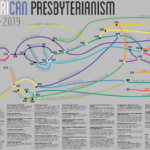The Means of Faith
Wesley Hill’s essay this morning in the Los Angeles Review of Books is troubling for the reality it exposes. Hill begins by relating a story from his college days when a classmate was in agony over her salvation status as a result of studying Jonathan Edwards. In contrast, another classmate who simultaneously studied Edwards, was about to be confirmed in the Roman Catholic Church, and Hill asked him why.
My friend was slow in replying. ‘When I was an evangelical,’ he finally said, ‘I was always wondering whether I was doing enough. Or whether I was studying enough—had figured out the Bible well enough—or praying enough. I felt that I had to sort out my theology and gauge whether I was ‘spiritual’ enough. But, being Catholic, I don’t have to figure anything out. I trust the Church to offer salvation. Communion is the body and blood of Christ, and when I receive it, I know I’m receiving grace.’
When the Roman Catholic Church’s practices offer assurances of grace and evangelical culture does not, something has gone terribly wrong. Hill is commending Philip Cary’s book on the subject, Good News for Anxious Christians, and argues that Protestants can recapture this calm through liturgical and sacramental practices. He’s right: too often evangelicals look inwardly for their own assurance of salvation, when the gospel is that Jesus is our assurance of salvation. When experience rather than the work of Christ becomes the ground of assurance, anxiety (or pride) is all that remains. The worship of the church, at least in its historic forms, was designed to root people in doxological encounter with Jesus; recovering that is recovering faith in Jesus instead of pressing for faith in faith.
The Spirit in Baptism Regenerates – Gregory of Nyssa
Baptism, then, is a purification from sins, a remission of trespasses, a cause of renovation and regeneration. By regeneration, understand regeneration conceived in thought, not discerned by bodily…’Unless a man be born of water and of the Spirit, he cannot enter into the kingdom of God.’ Why are both named, and why is not the Spirit alone accounted sufficient for the completion of Baptism? Man, as we know full well, is compound, not simple: and therefore the cognate and similar medicines are assigned for healing to him who is twofold and conglomerate:— for his visible body, water, the sensible element — for his soul, which we cannot see, the Spirit invisible, invoked by faith, present unspeakably. ‘For the Spirit breathes where He wills, and you hear His voice, but cannot tell whence He comes or whither He goes.’ He blesses the body that is baptized, and the water that baptizes. Despise not, therefore, the Divine laver, nor think lightly of it, as a common thing, on account of the use of water. For the power that operates is mighty, and wonderful are the things that are wrought thereby.
-Gregory of Nyssa, On the Baptism of Christ
Baptism Gives Life by the Spirit – Gregory of Nyssa
In Holy Baptism, what is it that we secure thereby? Is it not a participation in a life no longer subject to death? I think that no one who can in any way be reckoned among Christians will deny that statement. What then? Is that life-giving power in the water itself which is employed to convey the grace of Baptism? Or is it not rather clear to every one that this element is only employed as a means in the external ministry, and of itself contributes nothing towards the sanctification, unless it be first transformed itself by the sanctification; and that what gives life to the baptized is the Spirit; as our Lord Himself says in respect to Him with His own lips, “It is the Spirit that gives life;” but for the completion of this grace He alone, received by faith, does not give life, but belief in our Lord must precede, in order that the lively gift may come upon the believer, as our Lord has spoken, “He gives life to whom He wills“.
-Gregory of Nyssa, On the Holy Spirit, Against the Macedonians

